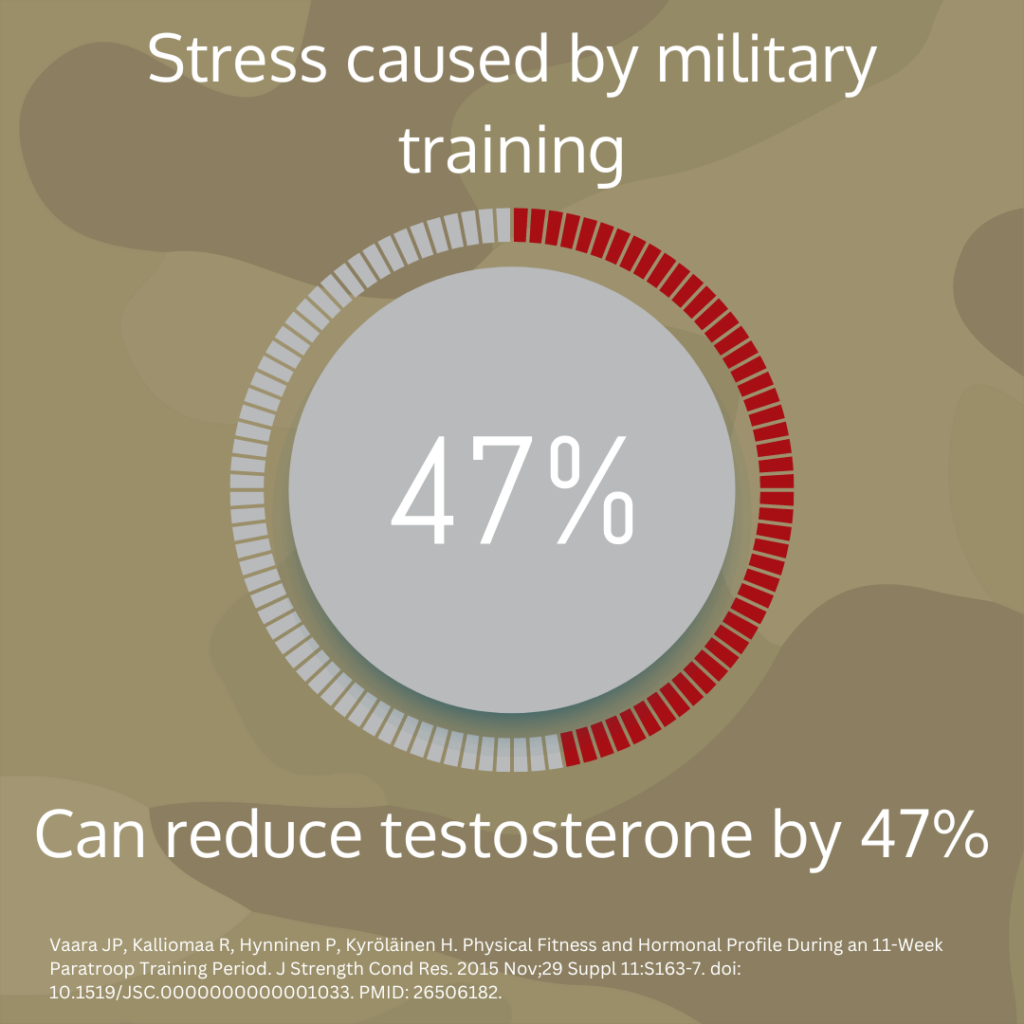Our brave military personnel experience more physical and mental exertion than most can possibly imagine. From the moment they decide to serve their country, they embark on a journey of rigorous training. They engage in intense fitness routines, are sleep-deprived and deal with unusually high levels of physical and mental stress. Low testosterone in veterans is more common than you would think. It is also common in any career that deals with high-stress situations, such as in the police, firefighters, and paramedics.

How Stress Causes Low Testosterone in Veterans
It's no secret that our military pays a high price for serving. While many of the soldiers return with physical injuries we can see, many more also come home with long-term injuries we can't see.
Post-Traumatic Stress Disorder (PTSD), nerve damage and traumatic brain injuries (TBI) are some of the most common 'invisible' injuries we know about, but they aren't the only devastating injuries they deal with.
Unlike most people, our soldiers spend their careers in a constant state of high stress. From the moment they begin boot camp, their schedule is as demanding as you'd ever experience. On top of that, they're managing deployment, combat, and the accompanying hardships.
According to studies,1 soldiers are required to perform in a multi-stressor environment. Under that stress, the body releases the flight or fight hormones, which spike adrenaline and raise cortisol levels for long periods, without the ability to rest and reset.
While the high alert state works in the short term to protect us from danger, our bodies are not meant to perform in the state long-term. One study2 showed that the stress that affects a soldier's mind and body might pose certain risks to their hormones, such as disrupting hormone balance, affecting hormone production and interfering with testosterone production.
Testosterone Decline
Although testosterone levels naturally decline as men age, on average, 40% of men over 45 have low T. According to one study,3 young men aged 15 to 39 have testosterone levels that have declined by 25% from 1999 to 2016.
This isn't good news for veterans. While low testosterone is linked to the stress of serving, it's also associated with lingering effects such as injuries, mental health issues and lack of sleep, which all come with a life in the military.
When our service members decide to serve, the health implications of that choice may not be their first thought. For many of them, the knowledge of low testosterone isn't even on the radar. So, even when they retire, they may not link their lingering health concerns with low testosterone levels.
The Connection Between Serving and Low Testosterone
While all service members experience health-related physical and psychological issues related to serving their country,4 men, especially those who engage in conflict, are at risk for low testosterone.

The issues that are most directly related to the development of low testosterone in military men include:
Extreme stress and Low Testosterone
Every aspect of deployment presents stressful situations; with it comes spikes in adrenaline and cortisol levels that change metabolic function. Long periods of stress and the hormonal changes that occur during these times put veterans at greater risk for developing low testosterone.
One study 5 linked stress and a decrease in testosterone of up to 47%, with the decline in levels starting within 12 hours. But Low testosterone levels are also associated with depression and other health concerns, which makes it more challenging to diagnose.
Substance Abuse and Low Testosterone in Veterans
According to a study,6 alcohol and drug use continues to be a problem among those who serve. It's used by military personnel to relieve stress and deal with social situations and is linked to various high-risk behaviors. Drinking also affects testosterone levels.
Sleep deprivation Can Cause Low T
Military life and the soldier's responsibility require them to be in challenging and dangerous environments. One of the issues they face under these conditions is sleep deprivation, which can last for long periods of time.
A study7 reported that the lack of sleep is a significant factor in a number of health issues, including cardiovascular health, metabolic disorders and cognitive health. Sleep deprivation can also affect testosterone levels. In one study,8 that deficit reduced testosterone levels as much as aging ten or more years.
This sleep deprivation can also result in various safety issues that include both personal safety and that of fellow military personnel and the mission itself.
Low T and Post Traumatic Stress Disorder (PTSD)
It's not unusual to hear veterans reporting physical and psychological issues about what they lived through during deployment. According to the US Department of Veterans Affairs,9 PTSD affects about 7% of veterans and 13% of female veterans.
Some of the symptoms of PTSD include:
- Flashbacks
- Anger
- Nightmares
- Anxiety
- Panic attacks
- Insomnia
- Depression
PTSD may play a significant part in low testosterone levels as metabolic changes can occur due to the symptoms of PTSD as well as low levels of vitamin D.10
Testicular Injuries Can Affect Hormones
While the public may not hear about all the injuries that service members can experience, injuries to the genitals and bladder are more common than you'd expect. Of course, these injuries can have a significant impact on testosterone levels.11
Brain Injuries and Testosterone Production
Undoubtedly, one of the most common injuries of war is to the brain, such as Traumatic Brain Injury (TBI), concussions, bleeding, bruising and other physical damage. According to a study,12 of those with TBI, 80% suffer from low testosterone levels, which could be due to pituitary gland damage and the production of luteinizing hormone (LH) that provides stimulation to the testes that produce testosterone.
The Secret Fight
Unless you've experienced military life, it may be difficult to understand why some of the issues that are part of serving remain a secret. Mike Simpson, MD, a former Airborne Ranger who served for three decades and a board-certified emergency medicine physician, reports that part of the training is not speaking up.
According to Simpson, "In the military, you judge yourself by: am I an asset, or liability," he says. "When you've been trained to make physical performance your self-worth, and you start to lose your edge, you feel like a liability. That's tough."
The training, the image and the belief that any weakness damages masculinity are enough to keep soldiers quietly suffering.
It's not unusual to discover that veterans may not understand the connection between the stress they endured and how it's connected to hormones and low testosterone levels. And while they attempt to manage it and other service-related health issues, getting answers isn't always easy.
Simpson states that the military teaches service members about the long-term effects of energy drinks and smoking but never mentions that the unending stress levels can have a lasting impact on hormones and health.
Health Risks Associated with Low Testosterone
Operating under extreme stress over long periods of time can cause low testosterone levels that may not be properly diagnosed. When untreated, it can increase the risk of a variety of serious health issues that include:
- Heart disease
- Fatigue
- Metabolic syndrome
- Diabetes
- Weight gain
- Deterioration of muscle mass
Service members with low testosterone can also experience anxiety, depression and increased PTSD symptoms, as well as various other psychological disorders that stem from hormonal changes and low levels of testosterone.
How Veterans Can Find Relief
Unfortunately, when service members seek help, their symptoms of depression, low energy levels and low sex drive are linked to other health problems and issues associated with aging.
And if they have PTSD or a TBI, the symptoms are often pinned to those disorders, making it challenging to have testosterone levels checked. The fact that most physicians are as unaware as military personnel of the effects of serving and its impact on testosterone makes it even more difficult.
So, how can those who have served and are experiencing symptoms of low testosterone get testosterone therapy for veterans? The first step is to pay attention to how you feel. For example, if you're run down, have a low sex drive and are experiencing depression, it's a good idea to get your hormones checked.
If testosterone levels are low, there are treatments that can help. Testosterone replacement therapy has the potential to give you back your clear mind, increase energy and improve your sex drive to what you once had.
Benefits of Testosterone Replacement Therapy
There's nothing wrong with wanting to look and feel your best. It allows you to live your life to the fullest with the people you love. TRT may be able to help. The benefits include:
Better Focus
TRT can help to improve focus and mental clarity by lifting the fog that can sometimes occur due to declining testosterone levels. Testosterone levels are directly related to cognitive processes and the ability to think more clearly.
Build Muscle Mass
Testosterone is well known for giving men the ability to grow big muscles. However, as testosterone levels drop, it becomes more challenging to build muscle, even when your weight workouts haven't changed. TRT can help restore the ability to grow muscle again.
Increase in Bone Density and Strength
As testosterone levels drop, bone density declines, putting men at risk for osteoporosis and fractures. Testosterone plays an essential role in supporting and maintaining bone density.
Restores Sex Drive
When testosterone levels drop, sex is put on the back burner. Men typically lose interest as their sex drive diminishes. TRT can restore sex drive and increase interest in sex. In addition, for some men who suffer from erectile dysfunction, it can help to increase their ability to get and maintain erections.
Enhance a Sense of Wellbeing
Low testosterone levels can significantly impact mood and emotional health, which is related to irritability, depression and fatigue. TRT can promote a feeling of well-being.

Increase Cardiovascular Health
Testosterone aids in producing red blood cells necessary for a strong and healthy heart. TRT can help to raise testosterone levels back to a healthy range. In a US Department of Veterans Affairs study,13 men who raised testosterone levels were 24% less likely to have a heart attack and 36% less likely to have a stroke.
"In this large observational cohort with extended follow-up, normalization of TT levels after TRT was associated with a significant reduction in all-cause mortality, MI, and stroke."
European Heart Journal, Volume 36, Issue 40, 21 October 2015, Pages 2706-2715, https://doi.org/10.1093/eurheartj/ehv346
Conclusion
Military life isn't easy. From the beginning, those who serve are physically and mentally taken to the limits. Yet, they give everything they have to protect our country. And they do so, knowing how it may affect their health and well-being.
The one thing most veterans wouldn't expect to have to worry about is low testosterone levels. They most likely never thought that constant stress could have that effect or that low testosterone could be responsible for many of the issues they face when coming home.
The good news is there is help. Testosterone replacement therapy can make you feel like yourself again and maybe even better! If you think low testosterone could be an issue, why not check and see?

Find out if TRT Can Help You
TRT from Male Excel





